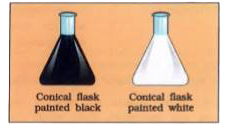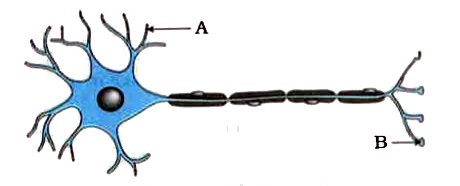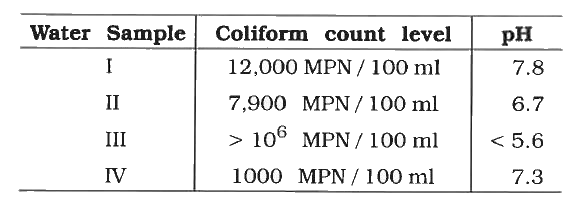To demonstrate, "black surface absorbs more heat as compared to a white surface".
Apparatus - Materials :
Conical flasks, water, thermometer

Procedure :
→ Take two conical flasks and paint one white and the other black.
→ Fill water in the both flask.
→ Place the conical flasks in direct sunlight for half an hour to one hour.
→ Measure the temperature of the water in both conical flask with a thermometer.
In which ways this finding can be used in our daily life ? Solution in Gujrati
Wearing black coloured clothes in winter and white colour clothes in summer.
White paint on the outer wall as well as white coating on terrace helps to maintain 2−3∘C low temperature inside the house during summer.
Topper's Solved these Questions
- SOURCES OF ENERGYBOOK - KUMAR PRAKASHANCHAPTER - SOURCES OF ENERGYEXERCISE - TEXTUAL EXERCISE
10 Videos
- SOURCES OF ENERGYBOOK - KUMAR PRAKASHANCHAPTER - SOURCES OF ENERGYEXERCISE - ADDITIONAL QUESTIONS AND ANSWERS
22 Videos
- QUESTION PAPER-2 (MARCH,2020 - BOARD'S QUESTIONS PAPER)BOOK - KUMAR PRAKASHANCHAPTER - QUESTION PAPER-2 (MARCH,2020 - BOARD'S QUESTIONS PAPER)EXERCISE - Section - C (Answer the following questions)
1 Videos
- SUSTAINABLE MANAGEMENT OF NATURAL RESOURECES BOOK - KUMAR PRAKASHANCHAPTER - SUSTAINABLE MANAGEMENT OF NATURAL RESOURECES EXERCISE - PRACTICAL SKILL BASED QUESTIONS WITH ANSWER
4 Videos
Similar Questions
A solar water heater cannot be used to get hot water on ……………..
View SolutionDistinguish between :
Solar Cooker and Solar Cell Panel
View SolutionFrom the diagram given below name the parts A and B . Also write the function of part A and Part B .

View SolutionThe water samples collected from four different water bodies. 1 - from the river of Sabarmati, II - from the Kankaria Lake, III - from Chandola lake and IV - from Narmada canal.

How do coliform enter in water body?
View SolutionA conical flask is full of water. The flask has base-radius r and height h . The water is poured into a cylindrical flask of base-radius mr . Find the height of water in the cylindrical flask.
View SolutionA conical flask of height 24 cm is full of water . If this water is poured into another cylindrical flask of radius half of the conical flask , then how much water - level of the cylindrical flask will be raised ?
View SolutionWhy is the mouth of the conical flask corked ?
View SolutionApparatus: Test tube, conical flask, balance, etc.
Chemicals: Sodium chloride and silver nitrate.
Procedure:
i. Take sodium chloride solution in a conical flask and silver nitrate solution in a test tube.
ii. Tie a thread to the test tube and insert it carefully into the conical flask. Make the conical flask air tight by fitting a rubber cork.
iii. Weigh the conical flask with the help of a balance.
iv. Now tilt the conical flask and mix the solution present in the test tube with the solution in the conical flask.
v. Weigh the conical flask again.
Which changes did you find?
View SolutionApparatus: Test tube, conical flask, balance, etc.
Chemicals: Sodium chloride and silver nitrate.
Procedure:
i. Take sodium chloride solution in a conical flask and silver nitrate solution in a test tube.
ii. Tie a thread to the test tube and insert it carefully into the conical flask. Make the conical flask air tight by fitting a rubber cork.
iii. Weigh the conical flask with the help of a balance.
iv. Now tilt the conical flask and mix the solution present in the test tube with the solution in the conical flask.
v. Weigh the conical flask again.
Did any insoluble substance form?
View SolutionApparatus: Test tube, conical flask, balance, etc.
Chemicals: Sodium chloride and silver nitrate.
Procedure:
i. Take sodium chloride solution in a conical flask and silver nitrate solution in a test tube.
ii. Tie a thread to the test tube and insert it carefully into the conical flask. Make the conical flask air tight by fitting a rubber cork.
iii. Weigh the conical flask with the help of a balance.
iv. Now tilt the conical flask and mix the solution present in the test tube with the solution in the conical flask.
v. Weigh the conical flask again.
Was there any change in the weight?
View SolutionA conical flask is full of water. The flask has base radius r units and height h units, the water pured into a cylindrical flask of base radius xr units. Find the height of water in the cylindrical flask.
View SolutionA charge 2q is placed at the mouth of a conical flask. The electric flux through the flask will be
View SolutionApparatus: Test tube, conical flask, balance, etc.
Chemicals: Sodium chloride and silver nitrate.
Procedure:
i. Take sodium chloride solution in a conical flask and silver nitrate solution in a test tube.
ii. Tie a thread to the test tube and insert it carefully into the conical flask. Make the conical flask air tight by fitting a rubber cork.
iii. Weigh the conical flask with the help of a balance.
iv. Now tilt the conical flask and mix the solution present in the test tube with the solution in the conical flask.
v. Weigh the conical flask again.
Which changes did you find?
View SolutionApparatus: Test tube, conical flask, balance, etc.
Chemicals: Sodium chloride and silver nitrate.
Procedure:
i. Take sodium chloride solution in a conical flask and silver nitrate solution in a test tube.
ii. Tie a thread to the test tube and insert it carefully into the conical flask. Make the conical flask air tight by fitting a rubber cork.
iii. Weigh the conical flask with the help of a balance.
iv. Now tilt the conical flask and mix the solution present in the test tube with the solution in the conical flask.
v. Weigh the conical flask again.
Did any insoluble substance form?
View SolutionApparatus: Test tube, conical flask, balance, etc.
Chemicals: Sodium chloride and silver nitrate.
Procedure:
i. Take sodium chloride solution in a conical flask and silver nitrate solution in a test tube.
ii. Tie a thread to the test tube and insert it carefully into the conical flask. Make the conical flask air tight by fitting a rubber cork.
iii. Weigh the conical flask with the help of a balance.
iv. Now tilt the conical flask and mix the solution present in the test tube with the solution in the conical flask.
v. Weigh the conical flask again.
Was there any change in the weight?
View Solution
